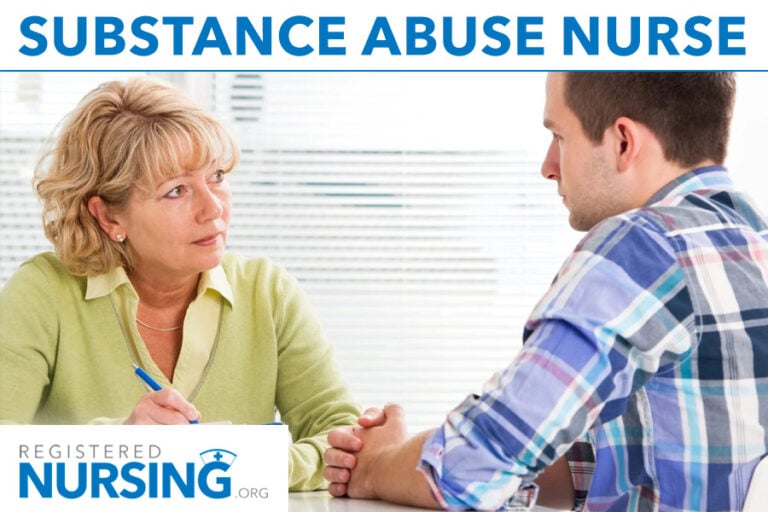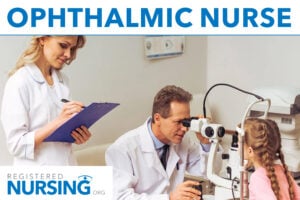Substance Abuse/Addiction Nurse

What is a Substance Abuse/Addiction Nurse?
A substance abuse nurse, sometimes referred to as an addiction nurse, specializes in the treatment of patients addicted to drugs, alcohol or other substances. Substance abuse/addiction nurses are trained in mental health in addition to general medicine. They provide pain management, education for patients and caregivers about the dangers of substance abuse, and emotional support to patients in crisis.
How to Become a Substance Abuse/Addiction Nurse
As with other nursing careers, the first step in becoming a substance abuse/addiction nurse is to complete an Associate's Degree in Nursing or Bachelor of Science in Nursing degree to gain a general nursing education. For aspiring substance abuse/addiction nurses, elective courses in mental health will be particularly important. Once a nurse has completed schooling, they must pass the NCLEX-RN exam. From there, an RN may begin work as a substance abuse/addiction nurse. Certain employers may require that the RN gain certification as a Certified Addictions Registered Nurse (CARN).
A typical job posting for a substance abuse/addiction nurse position would likely include the following qualifications, among others specific to the type of employer and location:
- ADN or BSN degree and valid RN license
- Ability to make safe judgment calls in patient care
- Strong communication skills for educating patients and their families about the dangers of substance abuse and their treatment options
- Proficiency in computer programs and data entry for maintaining patient records
- Experience in mental health and/or addiction preferred
- Caring and professional demeanor with compassion for patients struggling with addiction
What Are the Schooling Requirements for Substance Abuse/Addiction Nurses?
Substance abuse/addiction nurses are generally required to have completed an ADN or BSN degree from an accredited nursing school and hold a valid RN license in the state where they plan to practice. A higher nursing degree is usually not required unless the RN wishes to become an Advanced Practice Certified Addictions Registered Nurse (CARN-AP), in which case a minimum of an MSN degree must be held. At any degree level, elective courses in mental health and addiction are critical for students interested in pursuing a career in substance abuse nursing.
Are Any Certifications or Credentials Needed?
Once a nurse has completed 2,000 hours of professional nursing experience in the substance abuse sector and 30 hours of continuing education related to addictions nursing within the last three years, he or she may sit for the Certified Addictions Registered Nurse (CARN) certification exam offered by the Addictions Nursing Certification Board (ANCB).
There is also an opportunity to gain certification as an Advanced Practice Certified Addictions Registered Nurse (CARN-AP) through the ANCB. This certification requires a Master’s of Science in Nursing (MSN) or higher, as well as 45 hours of continuing education and 1500 hours of advanced-practice addictions nursing experience (with a minimum 500 hours of supervised addictions nursing experience) within the last three years.
Both of the CARN certifications are valid for four years. While not required for all substance abuse nursing positions, the CARN certifications communicate a nurse's commitment to substance abuse nursing to prospective employers. Here’s a breakdown of these and a few more addictions-based certificates:
| Certification | Length of Program | Key Differences |
| Certified Addictions Registered Nurse (CARN) | Typically requires 2 years of nursing experience in addiction, plus passing an exam | Focuses specifically on nursing care for patients with substance use disorders; recognizes clinical expertise. |
| Certified Addictions Registered Nurse-Advanced Practice (CARN-AP) | Typically requires 3 years of nursing experience in addiction, plus a master's degree, and passing an exam | For advanced practice nurses, including nurse practitioners; involves a higher level of clinical knowledge and responsibilities. |
| Certified Addiction Counselor (CAC) | Varies by state, often requires specific hours of training | Although typically for counselors, nurses may pursue this to complement their addiction treatment skills; varies by state. |
| Certified Substance Abuse Counselor (CSAC) | Varies, typically 6-12 months of coursework and supervised experience | Generally pursued by those working directly with addiction counseling; may include less focus on medical aspects than nursing-specific certifications. |
| Certified Clinical Supervisor (CCS) | Varies, often requires multiple years of experience and specific training | Focuses on supervisory roles in addiction treatment; suitable for those in leadership or training roles within the field. |
| Advanced Certification in Addiction Nursing (ACAN) | Typically requires extensive clinical experience | An advanced certification for those with significant experience, focusing on complex cases and leadership in addiction nursing. |
What Does a Substance Abuse/Addiction Nurse Do?
A substance abuse/addiction nurse provides direct patient care to individuals struggling with substance abuse and addiction. They assist physicians in developing treatment plans, performing patient assessments, monitoring a patient's progress, and administering medications and pain management services. An important aspect of substance abuse nursing is mental health and emotional support services. Substance abuse/addiction nurses often conduct mental health screenings and provide emotional support for patients and their families during treatment. They also educate patients and their loved ones about the dangers of substance abuse and provide resources and information about the various treatment options for addiction.
RELATED – What Different Settings Do Addiction Nurses Work In and What Are Their Job Duties in Each Setting?
Where Do Substance Abuse/Addiction Nurses Work?
Substance abuse/addiction nurses work with patients and their families in a variety of settings, including:
- Mental health clinics
- Psychiatric wards in hospitals
- Inpatient or outpatient substance abuse treatment facilities (a.k.a. rehab facilities)
What Are the Roles and Duties of a Substance Abuse/Addiction Nurse?
- Perform patient assessments and medical screenings at admission and monitor patient's status throughout treatment
- Assist physicians with developing individual treatment plans and implement and monitor those plans
- Administer medications and provide pain management services
- Update and maintain patients’ medical records and charts
- Educate patients and their loved ones about the dangers of substance abuse and various treatment options
- Provide emotional support to patients and their families struggling with addiction, which may include organizing and facilitating support groups
Substance Abuse/Addiction Nurse Salary & Employment
Substance abuse/addiction nurses are in high demand across the country as the number of individuals suffering from substance abuse and addictions rises. The median wage for registered nurses as a whole is $86,070 annually according to the U.S. Bureau of Labor Statistics, and nurses with specialized skills and knowledge may earn even higher incomes. Relevant certifications, such as the CARN certification, can also help nurses earn higher pay.
| Yearly Salary | |
| Top Earners | $132,680 |
| Top 25% | $104,670 |
| Median Pay | $86,070 |
| Bottom 25% of Earners | $75,990 |
| Lowest Earners | $63,720 |
Helpful Organizations, Societies, and Agencies
- International Nurses Society on Addictions
- Journal of Addictions Nursing
- American Society of Addiction Medicine
- Substance Abuse and Mental Health Services Administration








